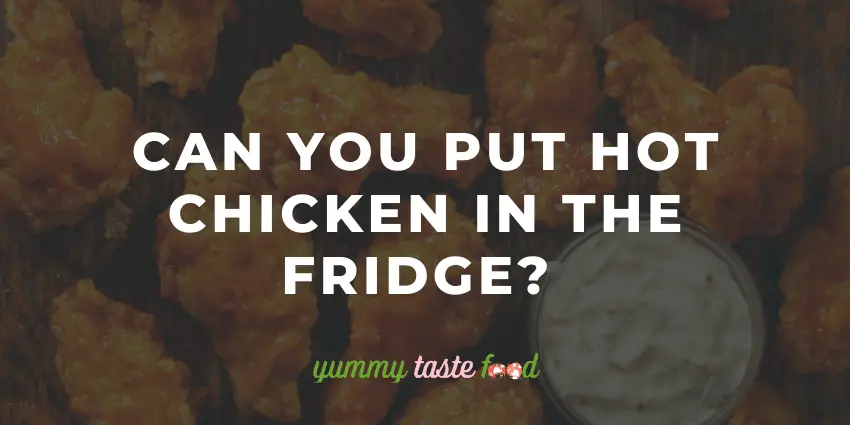
Newsletter Subscribe
Enter your email address below and subscribe to our newsletter

Enter your email address below and subscribe to our newsletter


Can you put hot chicken in the fridge? Yes, depending on how hot the chicken is. Scalding hot chicken shouldn’t be put straight in the fridge because it can defrost other foods and potentially break the temperature motor of your refrigerator.
You can store warm or slightly hot chicken in your fridge to keep it fresh or chill your chicken and bring it down in temperature.
Making a hot chicken dish and storing it in the refrigerator to chill it down might seem convenient, but is it worth it?
When I was a chef, we used to prepare lunch or dinner service by steam-cooking chicken in massive batches, we needed to bring it down in temperature as fast as possible, and the best way to do that was by setting the tray of cooked chicken on a bench for 20-30 mins to let it cool. We then would have put them into plastic containers and set them in the refrigerator to help bring them down in temperature.
Find out more about the dos and don’ts of storing fresh chickens in your refrigerator, the best way to approach it, and some key guidelines to remember!
Refrigeration is a revolutionary invention that has enabled us to prolong the shelf life of food products while being safe from the harmful growth of bacteria.
Bacteria love food as much as we humans (if they are not more), which is why every health organization urges people to keep food items at the right temperature and time to prevent the growth of bacteria.
However, is there any evidence for the idea of storing hot food in the refrigerator? Shouldn’t we be told not to do this?
The truth is that the notion that you shouldn’t keep hot food in your refrigerator is a myth. This is why most people do not give their refrigerators the recognition they deserve!
The function of your refrigerator is to provide a continuous flow of cold air that keeps food cool It’s obvious, isn’t it? You’ll be amazed by how many people overlook this basic fact.
If you include any hot food in the fridge, it will be able to continue doing its job without being “overburdened” or malfunctioning, as some would think.
The temperature inside the fridge may be a little higher, but it’s unlikely to alter the quality of other foods stored in the refrigerator.
Remember that most modern refrigerators come with an inboard system that checks the temperature inside the storage compartment, i.e., where you store all your food.
For instance, in the case of refrigerators that use inverter technology, the inboard system will boost the capacity of the compressor to accommodate the temperature change that is occurring in the surrounding area, and even though your fridge might “work” a bit more than normal, however, it will return to its normal level within a matter of minutes.
Even if you’ve got an ordinary fridge at home You can count on it to keep food chilled even in the face of “tough odds.”
A normal fridge might require greater effort to lower the temperature back to normal. It won’t adversely affect the food stored in it or even the hot chicken!
You should be aware of a few aspects when it comes to freshly cooked chicken and when it’s piping hot.
As a first step, and is also recommended by a majority of health authorities, the ambient temperature in a refrigerator should be around 40 degrees F, and the freezer compartment needs to be maintained at a chilled zero degrees.
You shouldn’t put it straight into your refrigerator after cooking or frying chicken. The reason behind this is pretty simple. Steaming hot food can result in an extreme change in the temperature of the refrigerator, and if the food is hot, it can alter the quality of the other food items around it.
In any case, your refrigerator isn’t to blame. The constant flow of cool air inside the fridge is perhaps the easiest way to bring down the temperature of the food, but unless you are in an emergency, we wouldn’t recommend putting fresh oven hot food into your fridge.
So far in this guide, you will know you shouldn’t store hot or food items that are still steaming in your refrigerator and shouldn’t put them in the fridge for too long to store them.
If you’ve cooked a fresh batch of chicken that you don’t intend to eat right away, it is best to wait just a few minutes (15-30 minutes) before placing it in your refrigerator.
This allows the meat to chill enough to avoid causing any major temperature difference within the refrigerator.
Bacterial growth occurs when food temperature is between 40 and 140 degrees F. This means that when the temperature on the surface of the chicken exceeds 160degF, it is necessary to transfer it to the refrigerator to stop it from worsening.
Keep in mind that bacteria can multiply exponentially under ideal conditions each 20-minute period. That means you shouldn’t leave food in the room for longer than two hours. this period is shorter for those living in areas with hotter temperatures.
The most precise method to store hot chicken is a cooking thermometer (we love this multi-purpose thermometer available on Amazon). Chicken is typically cooked between 375 and 450 degrees, so adding very hot chicken to the refrigerator would not be logical.
The best approach is to rest for just a couple of minutes until the food is at an approximate temperature of 160-180 degrees F.
Be aware that most cuts of chicken meat need to be cooked to ensure the temperature reaches 160F. This ensures it is completely cooked and no bacterial traces within or surrounding the meat.
Using a thermometer for cooking, you can keep food in the refrigerator without a doubt, and we can assure you this instrument can go a long way toward a healthy and safe diet!
After taking the oven out, remove the chicken from its wrapper and remove any foil covering it. This will stop the chicken from becoming too cooked and can also aid in lowering the temperature.
Although you may be tempted to keep the chicken in foil to save time, this could work against the taste and quality of the chicken.
If you do not want a wet and “washed out” chicken, then allow it to air out.
Airing the chicken won’t just help bring the temperature down, but it will also aid in the reabsorption some of the flavors and juices released from the pan during cooking.
After the chicken cools down, you can put it on a foil cover and store it in the refrigerator – even if the bird is still warm.
Here are a few specific steps to store warm chicken items in the refrigerator:
The freezing of hot chicken is a different subject that is often a bit confusing. How can you store hot chicken from the oven and into the freezer?
This question isn’t easy because there are plenty of factors to consider. However, we’ll attempt to provide the most important points.
One thing to keep in your mind is that keeping food items that are hot in the freezer is only going to be accomplished if your refrigeration unit is operating at full capacity and there aren’t any other food items that could be affected by the heat generated by the chicken.
This technique is feasible because the freezer compartment can circulate extremely cool air that can take heat from the chicken and reduce it to the desired temperature in just a couple of minutes!
Consider how quickly hot food gets cooler when you blow it around. The same is true for freezers. when there is a constant circulation of extremely cold air, there is no possibility for the heat that escapes increasing the temperature inside the freezer compartment.
However, even then, you must be extra cautious before storing hot chicken inside the freezer.
We would not advise you to keep hot, smoldering chicken on the same baking tray straight after you take it out of the oven, as it could damage the interior of your freezer.
The most effective method is transferring your chicken to a larger container and then freezing it. However, it is also necessary to ensure that the storage container is freezer safe and is rated for high heat.
Combining plastic containers with hot food isn’t the ideal choice because the container may let food-borne chemicals escape, which could make it dangerous and possibly unsafe.
If you want to store hot steaming food items, we’d suggest carefully moving and storing your chicken inside a high-end storage container.
Another option is to put it off for a couple of minutes before chilling the bird. This option is generally reserved for those who do not intend to serve the bird on that day.
Freezing is a great method to preserve the meat while keeping it from becoming rotten. For example, if the time for the chicken to be stored in the fridge is a couple of days, you can achieve 2-6 months of storage time when you store it in the freezer!
But, like the refrigerator method, there are some things to remember. Here are some detailed instructions on how to keep hot meat in the freezer:
Here are some crucial tips and strategies to be aware of:
The storage of warm or hot food in the refrigerator is safe, it could also be a good option to avoid any growth in the number of bacteria, particularly if you don’t intend to eat your food the next day!
After you have learned the basics of storing hot food items in your fridge, let us look at a few related concerns:
Yes. So long as the chicken doesn’t pose the risk of “splatter danger,” you may put it in the freezer or fridge.
A better method to preserve the meat is to allow it to cool for around 10 minutes to ensure that it has the chance to evenly absorb all flavor and nutrients before freezing or cooling it down.
This is dependent upon how effective your refrigerator is. If your fridge is operating at 40 degrees and doesn’t have a history of poor cooling, then you could anticipate a significant increase in temperature within 10 minutes.
This effect can be twice as strong when keeping hot food items inside the freezer. 0 degrees F!
Yes! This is an excellent method to reduce the growth of bacteria and let the chicken cool without risking getting the freezer burned. This will also allow you to freeze your chicken more efficiently without losing taste or texture!